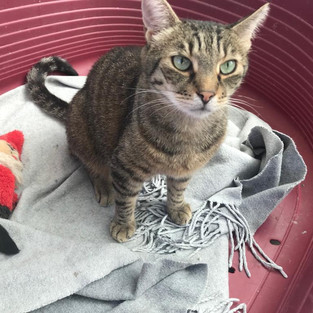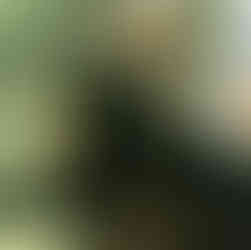Reflections after my first month of volunteering in Romania
- Fanny

- Aug 31, 2020
- 5 min read
Updated: Oct 4, 2020
As I write these words while in the train to Bucarest, I can't help but keep smiling. I smile despite the difficulty to leave the animals & the team at the SUST Galati shelter yesterday. I smile because I am happy & grateful that I could make this experience in the first place.

With the ongoing pandemic, the naysayers, my own doubts whether I would be "strong enough" to withstand seeing animals suffering, it could have been easy to give up and let those uncertainties become a real barrier to this trip. I could have sit back and waited for the perfect conditions - the stars to align. But I can't fathom why I should be sitting still and let the negativity win: I am not this kind of person. I truly believe in the power of positive thoughts and gratitude. I created this daily habit thanks to an app called the "Power of positive thinking" that sends me an uplifting quote every morning for over a year now. A simple way to remind me to enjoy the present and go with the flow, no matter what happens, there is a way forward! It's free so if you like the concept, you should give it a try :)
The last week at the clinic
So back on my journey and last week at the clinic & shelter in Galati. This week has been similar to the previous one in the sense I mainly took care of the cats staying in the observation room & the FIV+ cats separate room. I really got attached to some of them, as I witnessed their evolution and recovery from day to day.
One tomcat, named Costelus, had a bad wound under his chin (probably a dog bite) and now is almost fully healed after several weeks of treatment including antibiotics [see below the before/after photos]. He is so friendly each morning, waiting for his turn to get food & cleaning time – he enjoys the human contact. He also spends some long siesta in a comfy position, belly upwards, showing how well he got used to his temporary environment. These cases are more common than one would think. That’s a great example of why the Orphan Animal Hospital is so successful and is so much needed in this region of Romania. He got neutered and will be adopted by his rescuer, who fed him partially in the past but never took him inside.
About intentions & animal welfare
During the past month, I have been interacting & learning a lot from Lilu – the shelter & clinic manager – as well as the rest of the team Daniel, Irina, Mihaela, Gabi & Iulia. Each of them shared with me their perspectives on how one could support & improve animal welfare (check out this post for more details).
One aspect that struck me, is that despite good intentions, some people do nonetheless harm animals. It can be sometimes a fine line: one feeds some cats or dogs, but one doesn’t want to bear costs for a sterilization because they do not feel like their owner. One loves them when they are little yet abandon them when they grow old or get sick because they no longer fit their expectations for a pet. It’s tempting to think others will care for it given you see so many animals outside and they seem fine; so you just drop "yours" there and forget about it. And sadly also some people cannot simply afford the vet costs.

This lack of responsibility regarding pet owners is one of the local issues that awareness campaign and education are aiming to tackle. I did 2 evenings of flyer distribution in some mailboxes of the neighborhood, also to raise the awareness about the shelter/clinic. Awareness raising is a lengthy process though, one knows that mentality won’t change overnight and old habits die hard.
Yet I see this as sowing a seed, many may not germinate but if one does, it can grow into a beautiful plant and bear fruits later on.
About spay & neuter / TNR program

The topic of sterilization seems quite controversial especially. It has been demonstrated in the scientific literature that spay & neuter campaign, and also called Trap-Neuter-Return (TNR) when the animals are released where taken, is widely acknowledged as the first choice method in reducing & controlling long-term stray dogs & cats population [references: Zawistowski S et al., 1998, also check this article from ASPCA] – unlike mass culling which is still practiced in some countries. See schema on the left [from this website].
One study showed that TNR also contribute to decreasing the intake of cats in shelter [Reference: Levy J.K. et al. 2014], which ultimately avoid ending up with overcrowded shelters. The latter usually leads to other welfare issues or euthanasia if the animal is not adopted within a certain time frame.
I met with some locals in the neighborhood where I was staying, who were feeding cats in the evening. Two of them spoke good English (and French) so that we could discuss. I could tell they really loved animals; one of them was proudly sharing with me he buys Purina cat food (a quality brand) so they grow healthy. It was friendly and interesting discussions and I ended up given them also a few flyers from the clinic so they could distribute to their friends/other neighbors if they feel like it. When it came to the sterilization topic, especially asking "why none of the males are castrated?" - I couldn't get a clear answer. I had the impression there is a belief that spaying females is sufficient because they won't get pregnant anymore. That's partially true, yet there will always be one female somewhere not spayed in time before her first heat, who get found by an uncastrated male - and the circle goes on! I did a listing of the cats passing through my garden and the parking area and could count 18 cats, among them 2 lactating females and 5 uncastrated males - and that's certainly not an exhaustive list.

It's sadly not uncommon to find kittens or puppies abandoned in a box or plastic bag by a garbage container. My colleague Irina did save some abandoned, extremely young kittens found in late July. She bottle-fed them the first few weeks - day & night, it's a full time job - until soft wet food could be introduced, then gradually switch onto kitten dry food. It's heartwarming to witness the kitten who made it through (unfortunately several passed away too). She's a real warrior: look at her fierce look and strong claws after ~5 weeks of human love & supporting food :)
Next steps
The topic of ethics and animal welfare & health is complex. I have only started to dive into it and there is still so much for me to learn. One aspect particularly important and close to my heart, is the interdisciplinary collaboration to address such complex issues. Animal welfare & health is interconnected to human health & environmental health, among others. For this reason, I will start a postgraduate diploma part-time on the topic of One Health. More to come in due time!
I will also continue to volunteer in animal shelters during September - this time in Bulgaria after one week of break. I look forward to the continuation of my journey - I feel privileged to have this time off to contribute to helping animals in need along talented & motivated teams such as the one I met at the SUST shelter/clinic in Galati.
Thanks for reading and I wish you a great finish of your summer if you are in the Northern hemisphere & a fabulous start of September!






























Comments